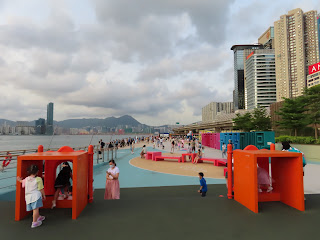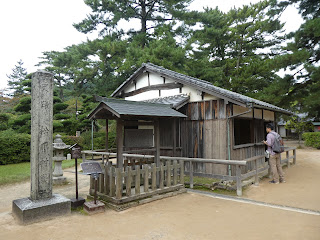Prime view of a Hong Kong sunset
The past few days have seen more jailings and political persecution. On Thursday, former Sha Tin District Council head, Li Chi-wang, was sentenced to seven months imprisonment for "“behaving in a noisy or disorderly manner in a public
place” during a demonstration on May 24, 2020 in Wan Chai against the
national anthem ordinance and the national security law which came into
force a month later." This finding prompted Louisa Lim, the author of Indelible City:Dispossession and Defiance in Hong Kong, to Tweet the following: "Seven months in jail for shouting, “The police are all rubbish.” Every day I seem to post another conviction in Hk which is more ludicrous, more tragic than the day before."
Regular readers of this blog probably won't be surprised to learn that Hong Kong has the second most rapidly increasing population of political prisoners (with Burma being this category's champions). "On May 11, HK had 1,014; June 6, 1,036; June 27, 1,048; July 28, 1,082. Hundreds of political trials are on-going, most for "riot" or under the National Security Law" whose repeal the United Nations Human Rights Committee has urged. But mere days after the United Nations Human Rights Committee did so, four former leaders of a defunct pro-democracy activist group find themselves facing sentences of up to seven years in jail after pleading guilty to inciting subversion under that draconian Beijing-imposed law.
Small wonder then that it's easy to conclude that Hong Kong's "once-thriving culture of political engagement has been obliterated", like in Ian Johnson's fantastic piece in The New York Review which took a look at four recent books on Hong Kong -- including Louisa Lim's Indelible City and Karen Cheung's The Impossible City: A Hong Kong Memoir -- and more. At the same time though, he referred to Hong Kong in a recent Tweet as an/the "Indestructible City" and noted that some of the authors of the books he wrote about "try to stay optimistic -- that somehow, the city's liberties won't die".
Two quotes from a third book that Johnson writes about -- Ho-fung Hung's City on the Edge: Hong Kong Under Chinese Rule -- are instructive. "Any Hong Kong observer would notice how swiftly and fundamentally the
social equilibrium underlining the relative political stability of
pre-1997 Hong Kong unraveled under Chinese rule." And yet: there seems to be the sense and possibility, Johnson mused, that "China might not want [-- or be able? --] to completely squelch all of its liberties"; leading to a situation where "Hong Kong is a city constantly on the edge. It is on the edge of great
powers, on the edge of being annihilated, and on the edge of breaking
free" (my emphasis).
So maybe there's some reason to stay optimistic after all. Citing another Johnson Tweet on the subject: "Let's hope so, because Hong Kong is a remarkable city, one of the world's great ones, and its people deserve the liberties that they have struggled for, first under British colonial rule and then under 25 years of largely botched Chinese rule."

























